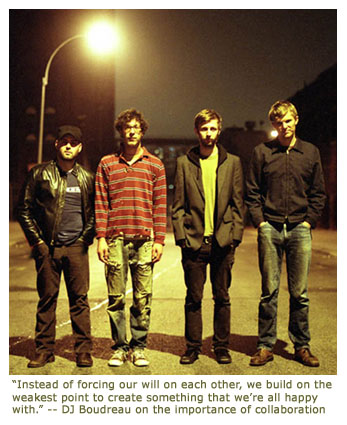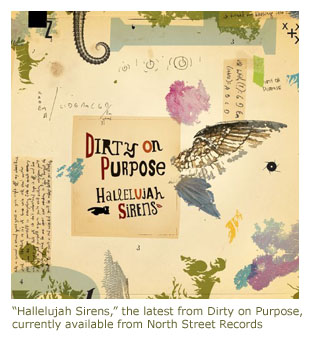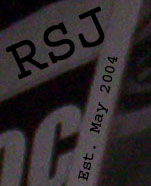|
New York's a fickle scene when it comes to who's hot and who's not. One day you're the next Strokes, the next somebody's
got a better video than you on YouTube, and you're yesterday's news. But for Brooklyn's latest contenders, Dirty on Purpose,
what the scene thinks is far less important than that old fashioned ideal of making good music. Something they've proved themselves
quite good at on their latest release, "Hallelujah Sirens," an album that marries dreamy melodies to shoegazer riffs,
calling to mind everything from My Bloody Valentine to Belle and Sebastian to Sonic Youth. Bassist DJ Boudreau discusses remaining
committed to doing it for the right reasons, and if the scene approves, well, then that's alright too. Though -- just for
the record -- they do have a damn good video on YouTube.
Rock Star Journalism: Having named your band with a reference to the Brooklyn music scene around you, how do you think being
part of that most affects you as a band?
DJ: It's true the name did grow out of the aesthetic here in Brooklyn a few years back. As far as how the scene affects
us, I'd simply say that we live here, and how can you not be affected by where you reside? But I think more importantly we're
a product of our past experiences outside of this band. If we didn't live in Brooklyn, we'd still be the same band we are
here. We've all made promises to ourselves that when we were in a band we'd try not to make the same mistakes or fall into
the traps that other bands do. For the most part, I don't think being in this scene really affects us much at all. I think
we're trying to remain detached from the scene.
RSJ: Obviously, New York is one of the most competitive areas in the US. What factor do you think most caused you to
begin getting attention?
DJ: I really can't overstate how important the blogging community was to our early foundation. We had only played a couple
of shows when an up and coming blogger came to see us play. The next day they wrote about us, and the next show after that
we had ten people standing right in the front taking pictures. Within a month of that show we were on a dozen blogs. It went
viral, as they say...though isn't "viral" just a terrible word? It's like pro-active. Yuck!
I also can't overstate how important it is to write good music; that's very important too. Just because you write good
music doesn't mean anyone will care or listen, but it helps.
RSJ: Your band seems to have a very collaborative music process. What, specifically, would you say each band member brings
to the table?
DJ: That's really hard to say. I guess no one specifically brings anything to the table. It's a very democratic and collaborative
process. That philosophy goes back to what I said about us trying not to make the same mistakes that other bands do. If there
were one member who came in and ruled over the rest of the band, this would be just another singer-songwriter with a backing
band. How fulfilling is that for the rest of us? The press often says things like "intricate, swirling, guitar interplay"
and "layers of melody, elaborate vocal harmonies." It's not just one guitar or bass or vocalist that's creating
that. The music comes from all of us having a pretty good understanding of what we're trying to do as a whole. The members
of this band bring individual strengths, but instead of forcing our will on each other we build on the weakest point to create
something that we're all happy with.
RSJ: Having formed this band in 2002, would you say that your sound has changed significantly over time?
DJ: The sound changed somewhat just before we recorded the EP in 2004. I think up until that time we had been quite timid
on stage. We were trying really hard to play the songs as best we could without screwing up. Around that time [guitarist]
George and I started doing a lot of equipment upgrading with our effects as well as the amps we were using. This led to everyone
having to upgrade to more professional equipment. As this happened, we also began to let go a bit more on stage -- the once
clean, perfectionist sound started to decay into a more distorted, reckless type of stage show. And that led to a sound that
wasn't as stiff as our first EP might lead someone to believe.
 RSJ: What did you try to do differently in creating "Hallelujah Sirens," as opposed to the EP?
DJ: We really tried to incorporate more of a live feel. We knew just after the EP was finished that we hadn't accurately
depicted the live feel, and we wanted more of that on "Hallelujah Sirens." We kept all the same pop elements, structures
and hooks that were on the EP and tried to make them sound, I don't know...dirtier? The EP was recorded in the producer's
basement for the most part, so we had almost no access to equipment. We recorded "Hallelujah Sirens" in a real studio.
We had access to a lot more professional equipment, and we really tried to get bigger, more expansive sounds.
RSJ: You get a lot of comparisons to bands like Yo La Tengo and Belle and Sebastian. Do you feel that you are described
accurately in the press?
DJ: I think we are fairly well portrayed by the press. As long as they keep comparing us to bands I like, then I feel
we're doing the right thing. Sometimes someone will hit you with a comparison that just makes you scratch your head -- for
example Belly, Smashing Pumpkins -- but most of the time the music press is both accurate and kind to us. When we hear Ride,
Yo La Tengo, Jesus and Mary Chain, I think we're all pretty flattered. I must admit I wouldn't mind hearing more Rollerskate
Skinny, Colfax Abby and Verve references though.
RSJ: Whose idea was the jazzercise video for "No Radio?" Will anyone in the band own up to actually taking
a jazzercise class?
DJ: It was my idea, actually. And, as far as I know, not one member of the band has ever taken a jazzercise class. The
idea actually came when we were in the mixing process for the song. We were listening back to a mix and I said, "Joe,
this song just makes me want to move my feet." I think I did this little dance that maybe resembled some sort of step
aerobics move, and suddenly I had this vision of us leading a jazzercise class. For better or for worse, my vision is now
preserved for all mankind.
RSJ: You have a number of clips up on YouTube. Do you think that the popularity of this forum has made videos more important
for indie bands?
DJ: I think you have to wonder if the video format has been important for any band in the past ten years selling less
then a million records. Thanks a lot Real Life for ruining my MTV! Seriously, YouTube is a ton of fun, but unless you have
a big fat record contract or a friend who'll shoot a video for free, I don't think the music video is a very cost effective
way of getting music out to people. We have friends that shoot our videos for us on a shoestring budget, but we wouldn't be
investing the money if we didn't think there was an outlet like MTVU, M2, Fuse or YouTube to provide an audience.
RSJ: Outside of New York, what has been the best area for you to play?
DJ: We do well in a few of the major cities, especially the places we've played frequently. For example we'll have decent
shows in Boston, D.C., Chicago, Philly. But as we found out on this past tour, we also have decent followings in some areas
we never would have imagined, like San Francisco, Charlotte, North Carolina and most of Florida.
 RSJ: I read that you're going to be touring in the UK soon. Given that a lot of US indie bands gain popularity over there,
have you found that you already have something of a British following?
DJ: We get friend requests from all over the world on our MySpace page, so somehow people are hearing us overseas, but
my general feeling is that we're still pretty much a US band. We're testing the waters to see if a UK trip is really a valid
idea at this point. We will probably head over there in early 2007. God! That sounds so not rock 'n roll. What I meant to
say was that we're going to say fuck all and ride on the wing of the Concord all the way to London to rock the faces off some
Oasis huggin' Brits!
RSJ: You played the Siren Music Festival in Coney Island. Did you enjoy getting out of the clubs and playing outdoors
for a change? Do you find that you have to adjust your performance in any way for that forum?
DJ: We did enjoy Siren. That wasn't our first outdoor show, but it was by far the largest. The biggest difference between
a club show and a festival-style show is the sound. In a club you usually get a sound check for starters. And in a club, even
if the monitors on stage aren't that good, you can usually hear some bounce back from the room. In a festival situation you
generally have neither of those. It's do or die, be prepared for about anything, and be prepared for some potentially terrible
sound. If the sound sucks, just play your heart out.
RSJ: You've put in a lot of travel miles for this past tour. What's the best music to listen to on the road?
DJ: We had a lot of things going on in terms of listening options in the van. We've all been listening to the new Asobi
Seksu record a lot, so that was on pretty frequently in the beginning. As the tour went on, we found that comedy and spoken
word were a nice distraction from the road, so we listened to "Get In the Van," the Black Flag diary as read by
Henry Rollins and some David Cross CD. By the end of the tour, we were listening to the Band of Horses record a lot, as well
as Mojave 3 and Mazzy Star. When we were sick of music and bored of each other we'd do the NPR thing.
RSJ: Speaking of road travails, I heard that your van met with an untimely death very recently. Care to share any fond
memories of life in the van?
DJ: Oh yeah! The van we paid $400 dollars for, she was a beauty. The RPS 3000 (as we liked to call her) was a blue, 1994,
Ford Club Wagon. She had once been a police van for the NYPD and proudly displayed a white stripe around the entire van with
two worn off shields on each door and the word "Enforcement" on the front hood and the back door. When she sputtered
to a rolling stop on the side of a highway in North Carolina, she had 146,002 miles behind her -- that's about 93,000 miles
short of a trip to the moon or about 5.87 trips around the Earth's equator.
We once met the drummer for the band Stranger -- he now owns a red Pontiac Firebird and a repair shop in Pittsburgh --
due to her first breakdown. We also almost lost a tire at 75 mph in Denton, Texas. The man at the repair shop in Denton told
us that we were lucky that our breaks were tight because that was the only thing holding the wheel on. We once had to endure
over 100 degree temperatures while crossing a 7000 foot peak in Montana at 35 mph, while the heater was on full blast in order
to keep the engine from overheating. A woman that owned a tire shop in Birmingham, Alabama coined the name RPS 3000. The owner
of the shop came out and stoutly asked, "What year is this Rolling Pile of Shit?" as she stood there eager to write
the answer on a clipboard. Our van was the envy of every other band.
Got something to say about this feature? E-mail us.

|

